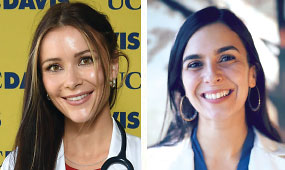Digital Startups: Where to Begin
Abstract
APA’s 2022 Mental Health Innovation Exchange provided an in-depth look at technologies that may someday lead to improved patient management. This is the last of a series of reports about the exchange.
New technologies have opened limitless doors of possibility for new generations of medical clinicians and researchers. Whether it is an automated text app that augments clinical care or a virtual reality (VR) headset that implements therapy, next-generation technology has made it possible to maximize the accessibility, quality, and efficiency of mental illness prevention, treatment, and management. But how do passionate new clinicians with bright ideas begin their journey into this exciting technological world?
At APA’s 2022 Mental Health Innovation Exchange, like-minded panelists noted that there is a Catch-22 if you’re a sprouting clinician interested in creating a digital platform. Armen Arevian, M.D., a psychiatrist and creator of the Chorus digital platform, expressed that to start a digital platform, clinicians need funds, but to get funds, clinicians need a working digital platform. The paradox of needing funds for production but concurrently needing production for funds causes ideas to get lost along the way.
This Catch-22 makes it almost impossible for new clinicians to implement their inventions into their patients’ care management. Rather, Arevian explained, what ends up happening is that technologies are created by tech companies that do not have clinical expertise but do have resources. Those new technologies benefit the tech companies and provide more resources, more resources allow companies to create more technologies, and so on. So those with funds gather more funds, and those with expertise do not launch their high-quality products.
Arevian commented: “Who gets to create and control technologies and who gets to benefit from technologies are often very uneven. And there is definitely a cycle where people who are winning continue to win and win more.”
Arevian has been one of the few physicians to break into this digital startup space and offers insight to others hoping to do the same. He said that “the key is not requiring very much [money]” and suggested turning to smaller pots of university funding and expanding on technology that already exists.
Two technologies that may be a valuable starting place for aspiring clinicians are Chorus and VR. Chorus is an easy-to-use, automated digital platform where clinicians create personalized text messages or interactive voice apps specific to their patients’ needs. The app uses machine learning to analyze patient speech patterns and predict and track their clinical state over time. Innovative mental health technologies like this give small startups the ability and power to create digital platforms that directly benefit their patients.
Psychologist Todd Maddox, Ph.D., shared his experience with AppliedVR: “We’re not reinventing the wheel. There’s decades of work on CBT, meditation, mindfulness, breathing. We’re just taking that foundational knowledge and building really high quality VR content.”
He continued, “In fact, if you’re in the clinical world and have any interest in creative technologies, you are the perfect person to create the technology. Everyone has different lenses and different expertise.”
In his opinion, the ones who should be creating patient care apps should be the clinicians themselves. Although many barriers remain when competing with tech giants, it is through small pots of funding and expansion of existing technology that new clinicians can become successful players in the world of digital startups. ■




